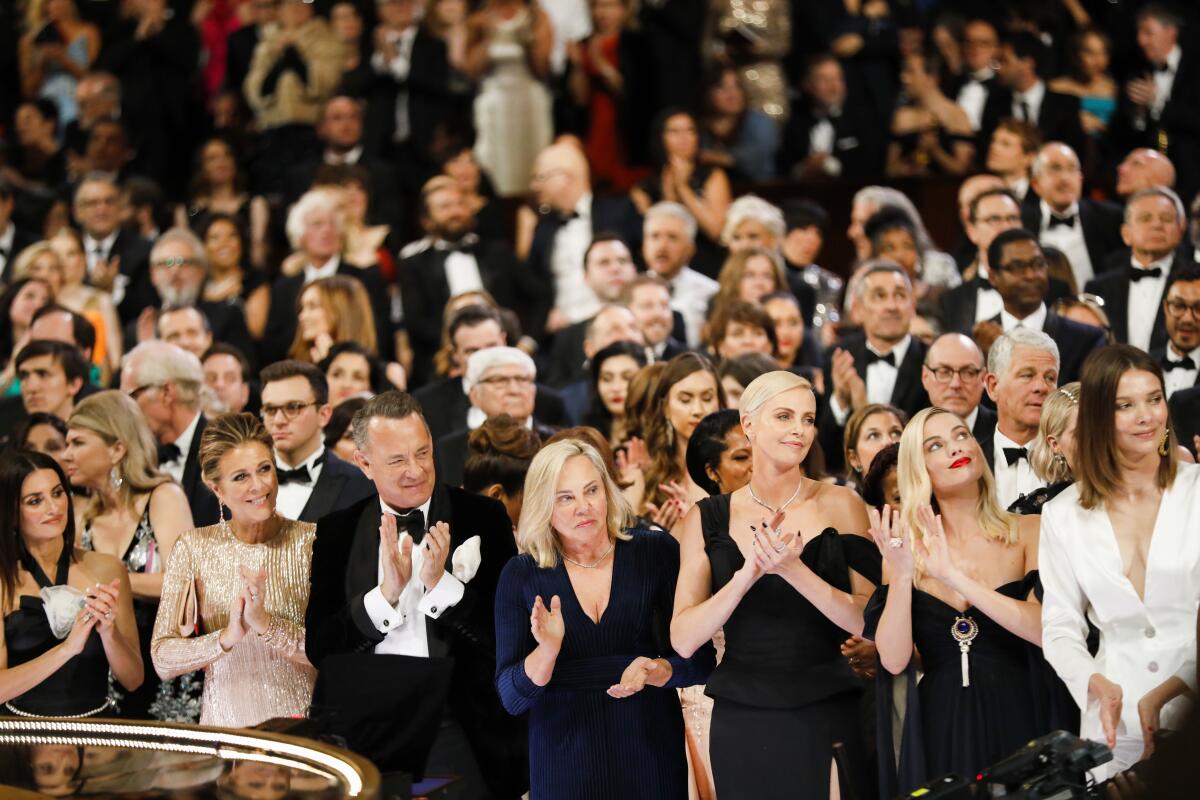The 2021 Oscars postponed to April 25 due to coronavirus concerns

- Share via
And the winner is … coronavirus.
In the latest sign of how profoundly the ongoing COVID-19 pandemic has upended Hollywood, the Academy of Motion Picture Arts and Sciences announced Monday that it is pushing back the date of the 93rd Academy Awards from Feb. 28 to April 25, 2021.
In a virtual Zoom meeting of the organization’s 54-member board of governors — which includes such luminaries as Steven Spielberg, Laura Dern and Whoopi Goldberg — academy leaders decided that a potential resurgence of COVID-19 in the fall and winter posed too great a risk to mount such a large-scale public event in February.
The eligibility period for Oscars consideration has been extended beyond the standard end-of-year deadline: to qualify, a feature film must now have a release date between Jan. 1, 2020 and Feb. 28, 2021.
At the same time, the group announced that it was also pushing back the scheduled opening of its long-delayed Academy Museum of Motion Pictures, previously set for Dec. 14, to April 30.
“For over a century, movies have played an important role in comforting, inspiring, and entertaining us during the darkest of times. They certainly have this year. Our hope, in extending the eligibility period and our Awards date, is to provide the flexibility filmmakers need to finish and release their films without being penalized for something beyond anyone’s control,” academy President David Rubin and Chief Executive Dawn Hudson said in a joint statement. “This coming Oscars and the opening of our new museum will mark an historic moment, gathering movie fans around the world to unite through cinema.”
The date changes follow an earlier move by the film academy to relax its eligibility rules this year because of the pandemic, allowing films for the first time to qualify for Oscar consideration without a theatrical release. Academy rules have long required that a film be screened in at least one theater in Los Angeles for a week to be eligible for Oscar consideration, a requirement clearly at odds with cineplexes around the country having been shut down for months.
With the coronavirus pandemic showing little sign of abating, the academy had been mulling the possibility of moving the awards for weeks. “We’re having ongoing discussions about all of this because we don’t have a crystal ball right now,” academy chief executive Dawn Hudson told The Times in late April. “We want to make the right decisions with as much information as we can — or I should say the right guesses. That’s really all we can do right now.”
In arriving at its decision to reschedule the Oscars, the academy consulted with studios and distributors about how much time they needed to get films ready for release and also worked closely with the Los Angeles Department of Health, which advised pushing the date as far out as possible given the lingering uncertainty over the progression of the pandemic.
Though in recent years the Academy Awards have been held in February or early March, there is historical precedent for a later date. Throughout the 1960s and 1970s, the Oscars were generally held in April, while the first Academy Awards ceremony was held even later, on May 16, 1929.
It remains to be seen how other film awards, including the Golden Globes and the various guild ceremonies — all of which have traditionally been held in the weeks and months leading up to the Oscars — may adjust their schedules accordingly. (The British Academy Film Awards, or BAFTAs, followed suit on Monday, pushing its ceremony two months back as well.) While the marquee fall film festivals in Venice, Toronto and Telluride have, for now, largely stuck to their plans, the postponement of the Oscars could also lead some of those gatherings to shift their dates as well, as the ripple effects spread through the whole awards-season ecosystem.
It is also unclear at this point how the Oscars ceremony, which is scheduled to air on ABC, might need to change should social distancing measures be required. In recent years, as ratings for the Oscars have steadily ebbed, academy leaders have pondered ways to revitalize the telecast. But the sight of a parade of celebrities strutting down the red carpet and the elite of Hollywood packed into the Dolby Theatre has always been seen as an essential draw, even as such glamorous spectacle has, for now, been rendered all but impossible because of the pandemic.
Out of caution, the academy announced that it is canceling this year’s annual honorary Governors Awards ceremony, which had been slated for November. It is still to be determined how those awards, which in years past were incorporated into the Oscars telecast, will be handed out.
“We find ourselves in uncharted territory this year and will continue to work with our partners at the Academy to ensure next year’s show is a safe and celebratory event that also captures the excitement of the opening of the Academy Museum of Motion Pictures,” said Karey Burke, president, ABC Entertainment.
Though no one knows how long the pandemic will persist or what sort of lasting impact it may have on the industry, academy leaders are clearly banking that interest in this year’s Oscars can be sustained for an extra couple of months, at least. “Movies matter more than ever, they are connecting more than ever and we miss going to the cinema more than ever,” Hudson told The Times in April.
More to Read
Only good movies
Get the Indie Focus newsletter, Mark Olsen's weekly guide to the world of cinema.
You may occasionally receive promotional content from the Los Angeles Times.









